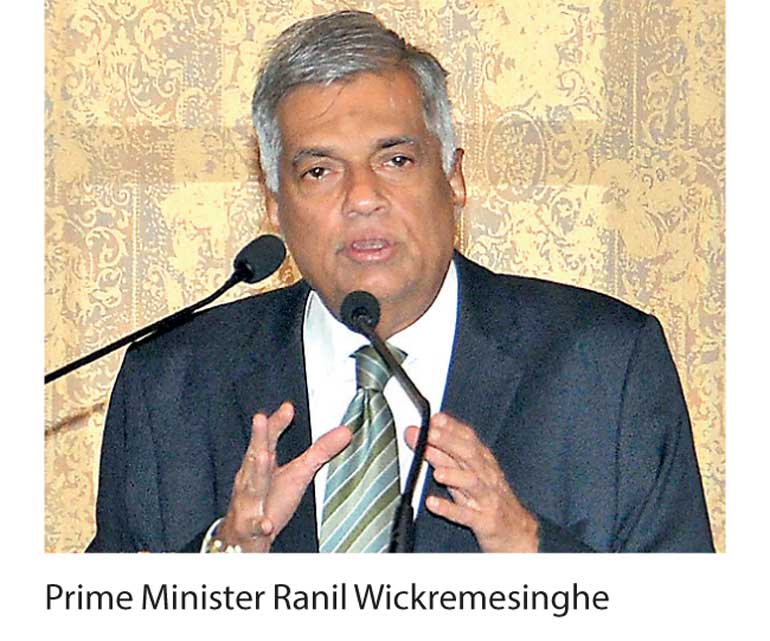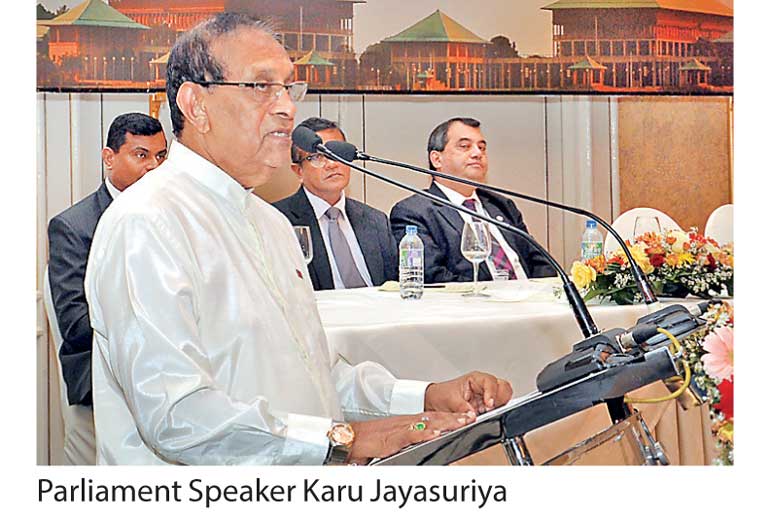Saturday Feb 21, 2026
Saturday Feb 21, 2026
Wednesday, 26 April 2017 00:07 - - {{hitsCtrl.values.hits}}
 As part of a series of measures taken to strengthen Parliament, the Government is drafting a Bill for a separate parliamentary budgetary office, Prime Minister Ranil Wickremesinghe said yesterday.
As part of a series of measures taken to strengthen Parliament, the Government is drafting a Bill for a separate parliamentary budgetary office, Prime Minister Ranil Wickremesinghe said yesterday.
Speaking at the Regional Meeting of Young Parliamentarians of the Asia-Pacific, Wickremesinghe noted that the powers vested in the parliamentary committees involved in public finance, namely the public accounts committee and the committee on public enterprises, have been strengthened.
"And we have introduced a third committee, the committee on public finance, to have oversight on public finance. With that we're now drafting a Bill to establish a separate parliamentary budgetary office," he said.
Previously the Executive had taken on too much power, so much so that even the traditional role of the Government backbenchers was being undermined, said the Premier.
"Generally in the Cabinet system, Government backbenchers have a bigger say than the Opposition members, but here it was felt that the Parliament was disregarded."
He said many political parties with different ideologies shared the sentiment that Parliament had to be strengthened.
"We were also of the view that the powers of public finance in Parliament had not been sufficiently strengthened. As a result of which we're now looking at means of paying back a huge debt that had been borrowed in the last five years," said Wickremesinghe.
The Prime Minister went on to say that within the next year a general agreement will be arrived at on the functioning of oversight committees. Some of the subcommittees have gone into areas which a Minister could not have had the time to go into, for example, in the case of medical schools, whether public or private.
This means that young parliamentarians as well as senior members in the Opposition have a role to play, said Wickremesinghe, adding that the Government is not confined just to a handful of Ministers and Deputy Ministers holding portfolios. The Government, he said, has found this to be a useful instrument, and it is now experimenting with the oversight committees.
Secondly, participation is sought from all Members of Parliament in the making of the proposed new Constitution, with the entire Parliament functioning as a committee for the constitutional assembly.
"Within it there's a steering committee which is now working on a report on the different areas we have covered and the principles we've agreed on," said Wickremesinghe, including devolution of power, changes to the electoral system, executive government, the judicial system, fundamental rights, etc.
The constitutional assembly has a separate secretariat with outside experts and that secretariat will ensure that once the report is tabled, the debate on the constitutional assembly steering committee's interim report can be debated, he said.
The Parliament's resources are also being strengthened, the Prime Minister added, commenting on new buildings added to the parliamentary complex. A women's caucus has also been established.
"Women's representation is insufficient in Parliament. I must admit that," he said.
A centre of parliamentary research will also be established to train MPs, among other things, he added. - Pix by Ruwan Walpola

Speaker Karu Jayasuriya said that young parliamentarians must arm themselves with a broad knowledge of Sustainable Development Goals (SDGs) in order to counter extremism in their constituencies.
Speaking at the Regional Meeting of Young Parliamentarians of the Asia-Pacific, Jayasuriya said that parliaments have a key role to play in combating global extremism through the implementation of the SDGs, first envisioned in 2015.
In this regard, young parliamentarians must engage in healthy dialogue with young people in their respective constituencies, and the onus is on MPs to act as role models, despite parliamentary politics being seen as corruption heavy and opportunistic, he said.
Extremist groups recruit the most vulnerable segment in any society, its disgruntled youths, who are today influenced by propaganda campaigns conducted through the internet. The Speaker that it was common knowledge that there were many underlying causes that bred and nurtured violent extremism. These include, he said, causes such as a lack of economic opportunities, lack of educational facilities, the alienation of the youth, exclusion of certain segments of society from economic activity, political and societal discrimination and discrimination on ethnic, religious and linguistic lines.
"In order to address this unfortunate situation, more opportunities should be offered to them," said Jayasuriya, adding that strategies must be formulated that encompass policies on strengthening human rights, eliminating inequality and establishing rule of law, while increasing the participation of women, youth and marginalised groups in decision-making.
Echoing Speaker Jayasuriya, the President of the Inter-Parliamentary Unit (IPU) Saber Chowdhury, who also spoke at the event, said that young parliamentarians as role models had a responsibility to inspire more young people to enter politics.
"We want you to be in charge, we want you to be in the driving seat, we want you to come up with new ideas, fresh insights, and think out of the box, and see how that can help us devise our own national plans to counter violent extremism," he said.
Pointing out that it operates on three levels, namely the national level, the regional context and the global dimension, Chowdhury said that national plan formulation is going to be particularly important.
"Look at legislation. Is there legislation that discriminates against the political aspirations of the community? How can we allocate more resources to education, for instance? How can we make sure that young people get the breaks and opportunities they deserve in life so they don't feel left behind?
"It's a challenging agenda but it is an agenda that can make a difference to the lives of the people we represent," he said.
